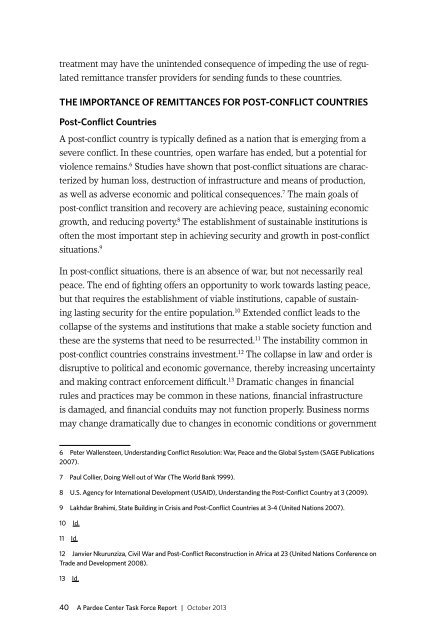Pardee-CFLP-Remittances-TF-Report
Pardee-CFLP-Remittances-TF-Report
Pardee-CFLP-Remittances-TF-Report
You also want an ePaper? Increase the reach of your titles
YUMPU automatically turns print PDFs into web optimized ePapers that Google loves.
treatment may have the unintended consequence of impeding the use of regulatedremittance transfer providers for sending funds to these countries.THE IMPORTANCE OF REMITTANCES FOR POST-CONFLICT COUNTRIESPost-Conflict CountriesA post-conflict country is typically defined as a nation that is emerging from asevere conflict. In these countries, open warfare has ended, but a potential forviolence remains. 6 Studies have shown that post-conflict situations are characterizedby human loss, destruction of infrastructure and means of production,as well as adverse economic and political consequences. 7 The main goals ofpost-conflict transition and recovery are achieving peace, sustaining economicgrowth, and reducing poverty. 8 The establishment of sustainable institutions isoften the most important step in achieving security and growth in post-conflictsituations. 9In post-conflict situations, there is an absence of war, but not necessarily realpeace. The end of fighting offers an opportunity to work towards lasting peace,but that requires the establishment of viable institutions, capable of sustaininglasting security for the entire population. 10 Extended conflict leads to thecollapse of the systems and institutions that make a stable society function andthese are the systems that need to be resurrected. 11 The instability common inpost-conflict countries constrains investment. 12 The collapse in law and order isdisruptive to political and economic governance, thereby increasing uncertaintyand making contract enforcement difficult. 13 Dramatic changes in financialrules and practices may be common in these nations, financial infrastructureis damaged, and financial conduits may not function properly. Business normsmay change dramatically due to changes in economic conditions or government6 Peter Wallensteen, Understanding Conflict Resolution: War, Peace and the Global System (SAGE Publications2007).7 Paul Collier, Doing Well out of War (The World Bank 1999).8 U.S. Agency for International Development (USAID), Understanding the Post-Conflict Country at 3 (2009).9 Lakhdar Brahimi, State Building in Crisis and Post-Conflict Countries at 3-4 (United Nations 2007).10 Id.11 Id.12 Janvier Nkurunziza, Civil War and Post-Conflict Reconstruction in Africa at 23 (United Nations Conference onTrade and Development 2008).13 Id.40 A <strong>Pardee</strong> Center Task Force <strong>Report</strong> | October 2013


